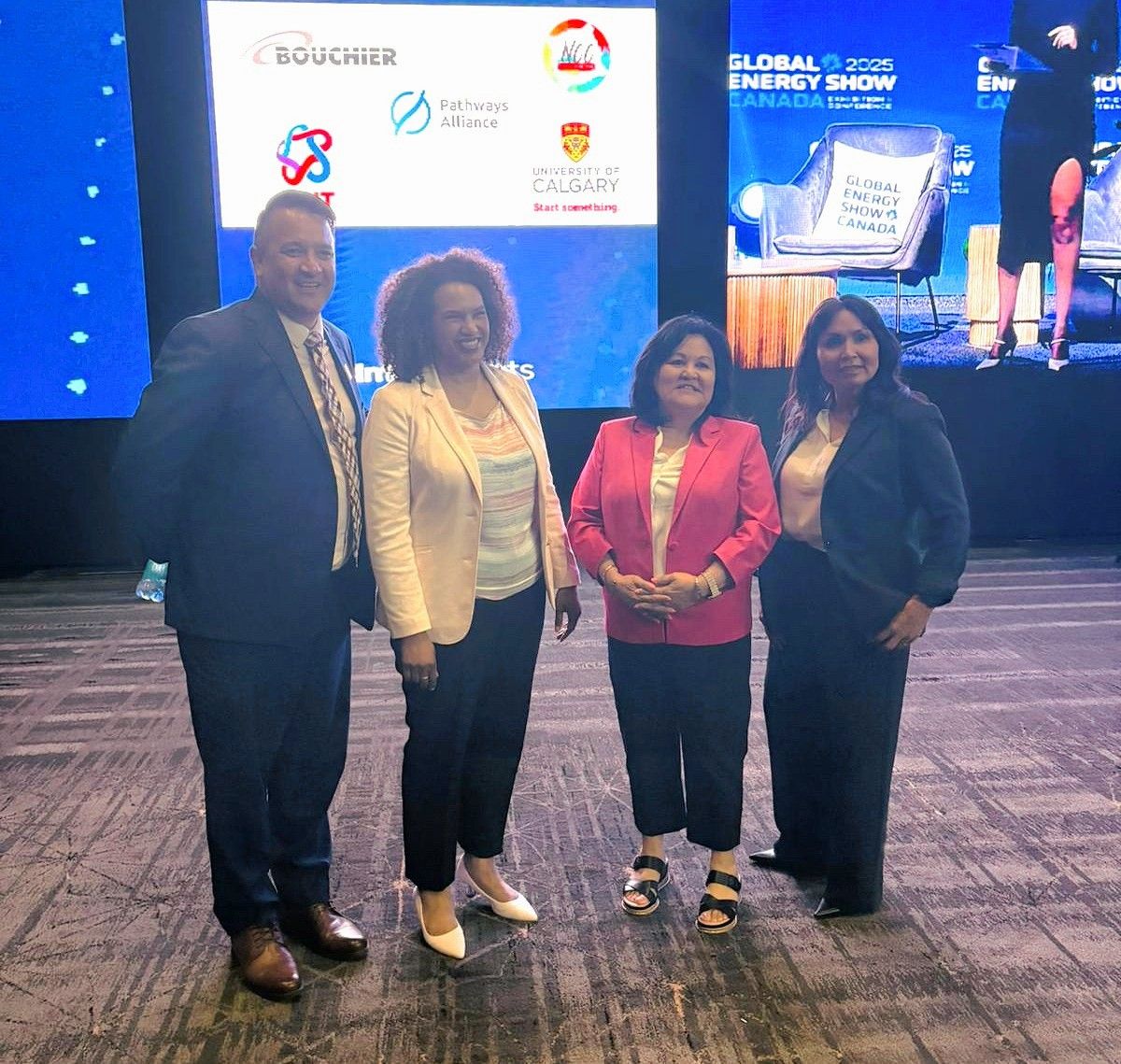Energy for a Secure Future was proud to participate in the 2025 Global Energy Show in Calgary—one of the world’s leading energy conferences, bringing together leaders from industry, government, Indigenous Nations, and international partners to shape a reliable, affordable and resilient future for energy.

This year’s conference powerfully reinforced a growing reality: Canada’s energy projects are being led by Indigenous Nations — and they are ready to meet the world’s need for reliable, responsible, low-emissions energy.
Opening the Conference with Indigenous Leadership
We were honoured to see Stephen Buffalo, President and CEO of the Indian Resource Council, an ESF affiliate organization, open the conference with a blessing and remarks that set the tone for the three days ahead. His presence on the main stage affirmed the central role of Indigenous Nations in shaping the energy conversation—as leaders, innovators, and partners in delivering projects that support both prosperity and environmental stewardship.
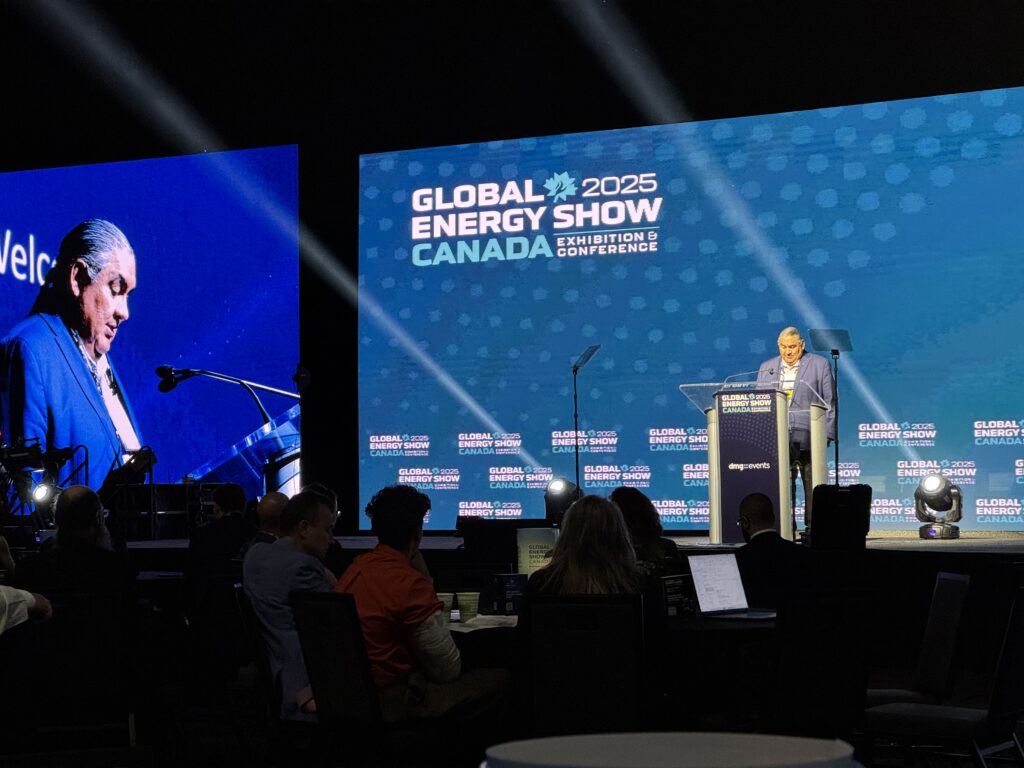
Partnering with the World – ESF’s Executive Conference Panel
On June 12, ESF Chair Shannon Joseph moderated the Executive Conference panel “Partnering with the World – First Nations Energy on the World Stage.” Joined by Andrew Robinson (Nisga’a Lisims Government), Chief Crystal Smith (Haisla Nation), and Karen Ogen (First Nations Natural Gas Alliance), the panel explored how Indigenous Nations are building global partnerships, attracting investment, and leading projects like LNG Canada and Ksi Lisims LNG.
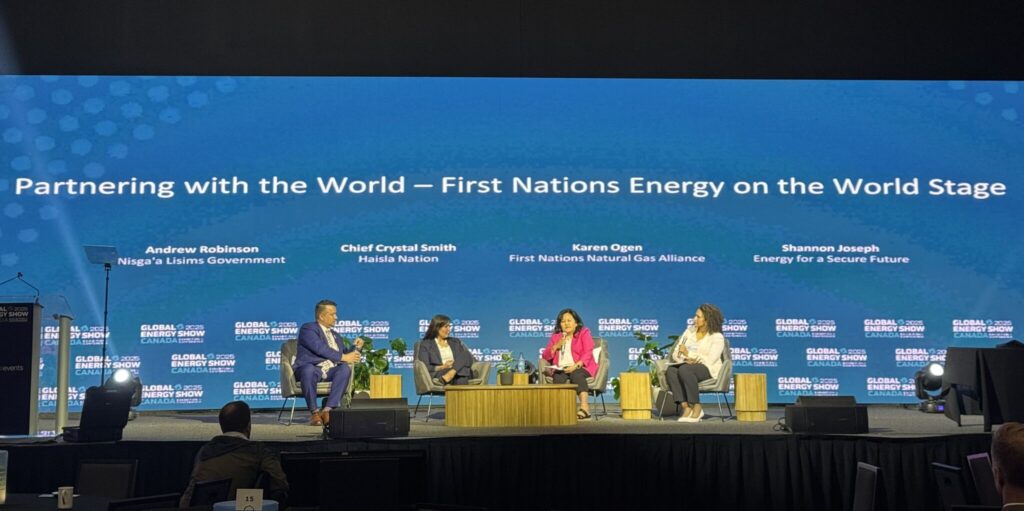
The discussion highlighted the power of partnerships and collaboration between industry and Indigenous nations which are helping Canada deliver major projects on time and on budget. At a time in Canada where Federal and Provincial legislation are adopting legislation to accelerate projects and creating new concerns among Indigenous nations, the panelists highlighted a path to success.
Ownership, dialogue between neighbouring First Nations, training & major project experience for local workers and a drive to prove nay-sayers wrong, have led to major successes in the development of liquefied natural gas projects in British Columbia. From the recently announced substantive start approval of the Prince Rupert Gas Transmission line to Cedar LNG and the Coastal Gas Link pipeline, a new model is emerging for the success of major projects in Canada.
- Chief Crystal Smith spoke to the shift taking place in many Indigenous communities—one that moves from dependency to full participation:
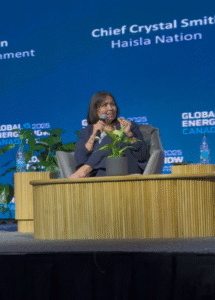
“For a long time, our communities were made to rely on outside entities. But we’ve shifted to a place of owning where we want to be for future generations. It’s about having a say and a share in the economic development taking place in our territories—and doing it on our terms.”
- Karen Ogen, CEO of the First Nations Natural Gas Alliance, emphasized the need for long-term planning, inclusive policy development, and practical action:
We have strong leadership in our communities, and we want to build long-term plans—for our people and for our participation in Canada’s energy future. But that means more than talk. It means policy that supports us, resources to close the gaps, and real engagement that leads to action. We need to be at the table, not just consulted—we need to be part of the plan.
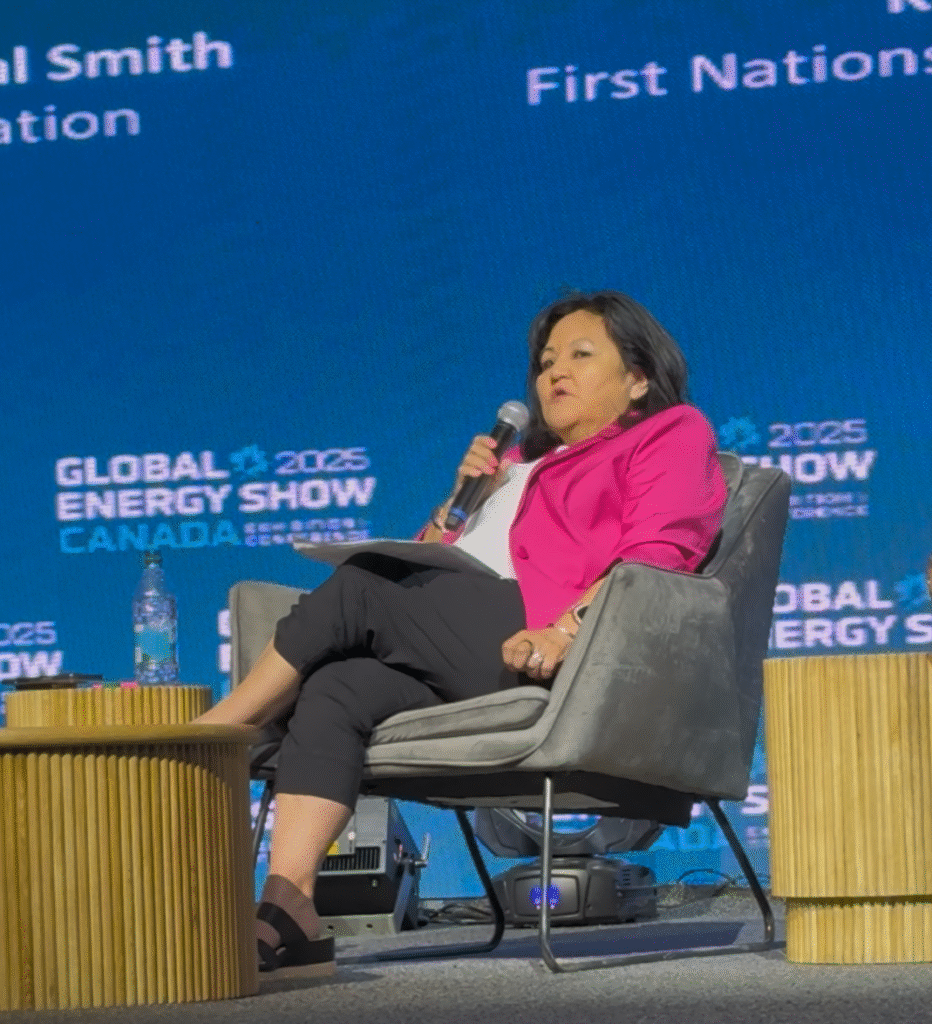
- Andrew Robinson, CEO of the Nisga’a Lisims Government, reflected on how Indigenous leadership is about integrating solutions—not isolating problems:
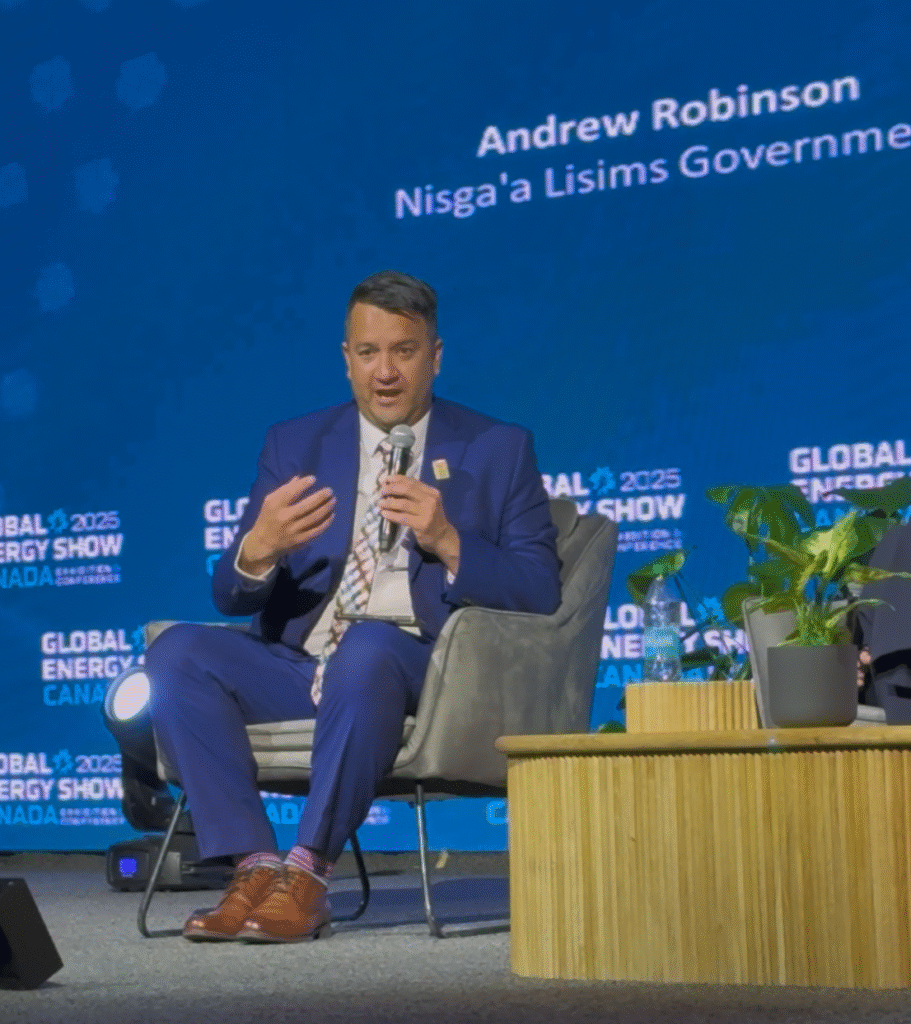
“People talk about the trauma or challenges Indigenous Nations face, but they rarely listen to how we see the solutions—as interconnected, grounded in culture, and led by those who carry the whole of our Nations in mind. In our culture, we speak of one heart, one mind, one being. That unity is what drives us forward.”
Tackling Energy Poverty at Home and Abroad
On June 11, ESF’s Harshivam Bawa moderated the panel “Tackling Energy Poverty in Indigenous and Developing Communities” in the Oil & Gas Theatre at the Energy Influencers conference.
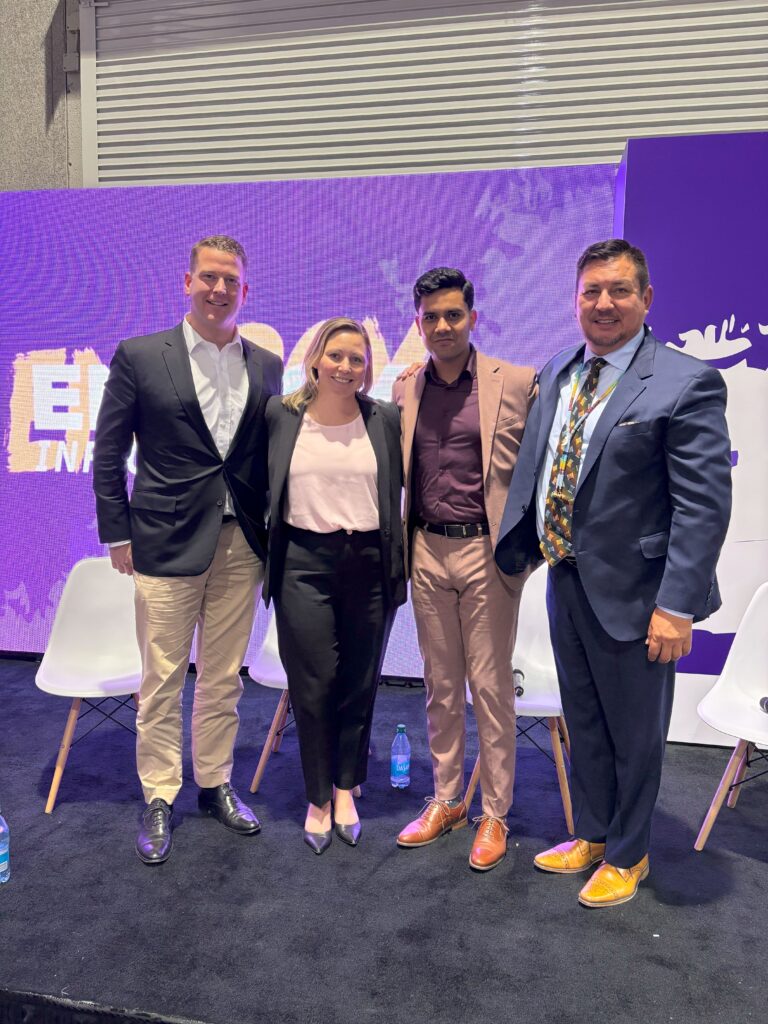
The panel featured:
- Guy Lonechild, CEO, First Nations Power Authority
- Dr. Heather Exner-Pirot, Macdonald-Laurier Institute
- Kevin Sullivan, VP of Energy Supply, JERA Americas
Speakers shared how energy poverty continues to be a major issue for millions of people across the world from Indigenous communities in Canada, to many countries in Southeast Asia. As an international community, expanding access to affordable reliable energy must be a central priority, even as we pursue environmental and other goals.
The conversation drew from Energy for a Secure Future’s recent paper The Other Energy Security: addressing energy insecurity in Indigenous communities, as well as from the experiences of a current LNG intake facility project being pursued in Vietnam. The latter project would help Vietnam reduce its use of coal and enhance the reliability of electricity for citizens and industry.
Panel – Opportunities for First Nations in Natural Gas
In addition to the panels above, a standout moment from Day 1 was the dinner panel “Opportunities for First Nations in the Natural Gas Industry,” featuring ESF affiliate organizations First Nations Natural Gas Alliance CEO Karen Ogen and Indian Resource Council CEO Stephen Buffalo, alongside Charlotte Raggett (Rockies LNG Partners) and Bruce Cullen (Gitga’at Development Corporation).
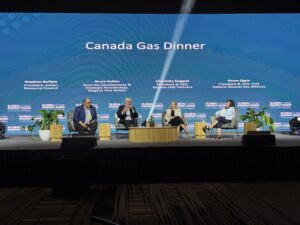
The panel offered practical insights on how Indigenous participation in natural gas projects is helping unlock long-term economic opportunity and advance reconciliation. Speakers emphasized the importance of ownership, equity, and sustained government support in making these projects a success.
ESF on the Ground – Conversations, Connections, and Collaboration
ESF Advisory Council member Ian Arcand took part in an LNG Roundtable hosted by Shell Canada on June 10, contributing to a conversation on Canada’s LNG future.
On June 11, John Desjarlais, Executive Director of the Indigenous Resource Network an ESF affiliate organization, joined the Executive Roundtable on Attracting International Investment to Canada’s Energy Sector.
Throughout the event, the ESF team hosted a booth on the main exhibition floor, welcoming visitors from across Canada and around the world. From sharing insights from our research reports and sharing the experiences of our network from energy security in Asia, to the LNG value-proposition, to reconciliation in Canada. Our booth became a hub for meaningful conversations about the future of energy.
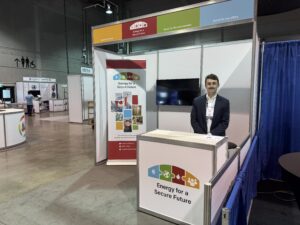
Key Takeaways:
- Asian countries are actively seeking low-emissions, stable energy suppliers and Canada is seen as one of them. Over the coming years, we need to ensure we have the right infrastructure and policy to attract investment, build and deliver for our allies. .
- Indigenous Nations are leading some of Canada’s most globally relevant energy projects—and are demonstrating success in navigating the regulatory process, building local support and constructing projects on time and on budget. Their experiences carry lessons for Canada in the moment of “build baby build.”
- Tackling energy poverty, whether in Canada or abroad, requires focus, as well as access to infrastructure and inclusive, long-term planning. It cannot be an after-thought and must be a priority if environmental concerns are addressed.
The Global Energy Show 2025 was a powerful reminder that Canada’s energy future is export-ready, partnership-centered and deeply connected to global priorities. ESF is proud to be supporting these efforts — and grateful to everyone who joined us in Calgary to keep the momentum going.
